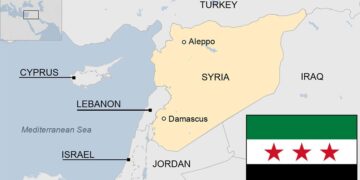The Growing Concern of Military Expansion in the Middle East
Introduction: A Shifting Geopolitical Landscape
The intricate dynamics of the Middle East have seen a notable shift toward heightened military activities among regional powers. This phenomenon poses significant implications not only for the nations involved but also for global security at large. As tensions escalate, understanding the underlying factors contributing to this military expansion is critical.
Regional Powers and Their Ambitions
In recent years, countries such as Iran, Turkey, and Saudi Arabia have been actively enhancing their military capabilities. For instance, Iran’s pursuit of advanced missile technology and drone warfare reflects its desire to assert dominance across the region. Simultaneously, Turkey has undertaken substantial defense investments, aiming to bolster its influence in areas like Northern Syria and Iraq.
Iranian Influence: A Case Study
A clear illustration of Iran’s expanding influence can be seen through its involvement in conflicts across the region—from Yemen to Lebanon. By supporting various non-state actors and militant groups such as Hezbollah and Houthis, Iran seeks not only regional hegemony but also aims at countering U.S. presence in these territories.
The Role of External Nations
The interests of external powers further complicate matters in the Middle East’s geopolitical landscape. The United States has historically maintained a strong military presence aimed at safeguarding its allies and countering threats from adversaries like Iran. Recent statistics reveal that U.S. defense spending related to operations in this region reached approximately $60 billion last year alone—underscoring its strategic importance.
Russia’s Strategic Maneuvers
Conversely, Russia has been cultivating relationships with several Middle Eastern nations while expanding its own military footprint through arms deals and joint exercises with countries like Egypt and Syria. These actions signify a broader objective: re-establishing itself as a formidable power on the global stage by leveraging instability within these nations.
Nationalism & Military Build-Up
The surge in militarization is often driven by rising nationalism within individual states seeking to bolster sovereignty amidst perceived external threats. For many leaders across the region, public sentiment leans towards strengthening national defenses as they face both internal strife—such as economic hardships—and external challenges posed by rival nations or insurgent groups.
Examples From History
Historically speaking, instances such as Iraq’s invasion of Kuwait demonstrate how nationalism intertwined with militarization can lead to conflict with severe consequences not just locally but globally too—exemplifying why current trends warrant vigilant observation today.
Consequences on Global Stability
As regional players stockpile weapons or intensify their military efforts beyond borders—for example through proxy warfare—the risks associated with accidental confrontations rise significantly; thus impacting international stability overall.
Potential for Conflict Escalation
Moreover incidents arising from misunderstandings between militaries could instigate larger conflicts that hold ramifications worldwide—a concept increasingly discussed among experts analyzing recent events involving naval encounters near strategic waterways (like Hormuz) crucial for oil transportation that fuels economies globally!
Conclusion: The Need for Diplomatic Solutions
Navigating this complex landscape requires comprehensive diplomatic efforts focusing on de-escalation mechanisms rather than perpetuating an arms race which might inadvertently plunge entire regions into chaos once more—as history suggests! Pursuing dialogue alongside fostering partnerships among supporters is paramount if lasting peace is ever hoped for amid persistent instability plaguing varied corners throughout this pivotal area known previously even nicknamed ‘the cradle’ owing largely due historical civilizations thriving here long back into antiquity echoed poignantly besides now needing thoughtful engagement more than ever before!
Keywords: Regional Military Expansion; Middle East Crisis; Geopolitical Tensions; Nationalism; Diplomatic Solutions















